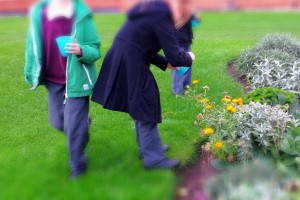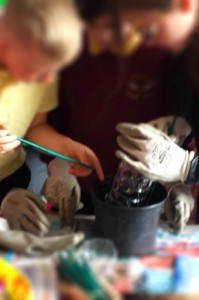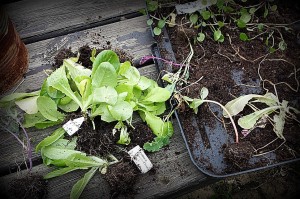- If the weather is still a bit wintery, put cloches, black sheets or fleece over the ground for a couple of weeks before you sow seeds to warm the soil up.
- If there are still signs of frost don’t plant your potatoes until April or May, but if the last frost has already been, plant your potatoes this month.
- Sow early Peas, Beetroot and Carrots outdoors- these should be ready before the end of the Summer term.
- Plant out the Onions you planted in January.
- Plant out some of the plants you had sown indoors last month (but make sure they’re at least 8cm tall)
- Remember to protect young plants from frost using cloches and fleece- why not get creative and make your own cloches out of plastic bottles?
- Make sure you have harvested the remainder of your Winter crops and clear away anything that needs to be composted.
- Make some plant labels for your new plants and for the forthcoming seeds you will have ordered.
- If the frost has lifted any new fruit canes, firm them down again but make sure that the ground has fully thawed before you do this.
April:
- Plant nectar rich flowers to encourage beneficial insects to the garden. Make sure you are keeping an eye on the pests in the garden.
- Plant early vegetables so they will be ready before the school holidays.
- Sow tender plants such as peppers and tomatoes indoors- Please bear in mind these will need to be looked after during the holidays.
- Plant early potatoes if you haven’t already done it last month. If you managed to plant them last month, your potatoes may be ready for you to start earthing up (covering the shoots that appear above ground with soil) continue this until they are ready to be dug up (early potatoes will be ready before the Summer holidays and maincrop will be ready in September)
- Prepare your runner and climbing French bean supports to save you time later on. A creative way to do this is to make a wig wam shape out of your canes (it looks even better if you are growing them in an old tyre)
- Keep an area of 1mx1m weed free around your fruit trees.
- Remove blossom from fruit trees that have just been planted. They need to put energy into becoming well established instead of producing blossom.
- Start to take some soft wood cuttings from your herbs (once they become established they could be sold on at school fairs- a good way to make some money for the garden.) Click Here for a guide on taking cuttings.
May:
- Keep on top of the weeding so that your fruit and veg do not lose water or light; use a hoe to get the weeds on a regular basis.
- You can leave weeds in one area to benefit wildlife and for the children to study if you wish.
- Don’t forget to water your plants!
- Sow runner beans outdoors
- Protect veg from late frosts and plant out seedlings sown in March and April.
June:
- Create a herb garden or plant more herbs in your existing one. Get the pupils to research the history of the uses of the herbs and get them to make perfumes by mixing the smells from the various herbs in cups with a little water.
- Sow outdoors: Pumpkins and Squashes (these will need to be looked after during the holidays)
- Harvest Salads, the first carrots, peas and potatoes. Harvest any soft fruit that might be ready early.
- Get pupils to investigate the good and bad insects of the garden- a fantastic resource for this is the Garden Organic Friend or Foe game.
- Research the way pests can be removed from the Garden Organically.
July:
- Make some bird scarers using recycled materials (old CD’s work really well, hung on a string from something, the reflections and the movement of them in the wind frightens the birds) Make some decorations for the garden and signs.

- Harvest any early crops that might be ready now such as the over wintered onions.
- Prune some of your fruit bushes.


